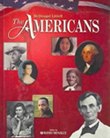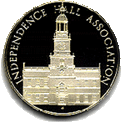American History Iby Matthew Caggia
- Unit 1A: Colonization & the 13 Colonies
- Unit 1B: Coming of the Revolution
- Unit 2A: Confederation & Compromise
- Unit 2B: The New Nation
- Unit 3: Sectionalism & Nationalism
- Unit 4: Reshaping the Nation
- Unit 5: Coming of the Civil War
- Unit 6: The Civil War
- Unit 7: Reconstruction
- Textbook
Unit 1A: Colonization
Chapter 1.4-3.3
Before we dive into the events of the American Revolution, we must first investigate the conditions in the Americas prior to the arrival of the Europeans. The factors that contributed to European colonization of the Americas were some of the underlying causes of the eventual American Revolution. Most importantly was the desire for economic profit; the colonists wanted to experience the fruits of their labor instead of seeing go back to the King. Therefore, we will look at the conditions of their economies, the diverse geography of the region, and the struggles of some of the earliest colonies.
Study Tools
Exploration and Colonization
This is my first video attempt at "flipping the classroom." This video highlights key events from World History that led to European exploration. It also spends time discussing Christopher Columbus and the Spanish treatment of Native Americans, Mercantilism, and the intorduction of the British Navigation Acts.
Use this KLG Guide to analyze and learn from the video. For more guidance, complete this Guided Notes before completing the KLG.
Jamestown & New England
The slideshows are best if viewed full screen. This slideshow highlights key aspects of Jamestown colony in Virgina and of New England.
Regional Differences
The slideshows are best viewed full screen. This slideshow highlights the economic differences between the three colonial regions: New England, Middle Colonies, and Southern Colonies
Indian Relations & Bacon's Rebellion
The slideshows are best if viewed full screen. This slideshow summarizes a few key conflicts between the colonists and Native Americans as well as Nathaniel Bacon's attempt to overthrow the government of Virginia.
Use these Indian Relations & Bacon's Rebellion Guided Notes while viewing the above presentation.
The Slave Trade
The Slideshows are best if viewed full screen. This slideshow explains the development of labor in the colonies from Indentured Servitude to Chattel Slavery, indlucing the Triangular Trade.
Use these The Slave Trade Guided Notes while viewing the above presentation.
Online Textbook Resources
 |
"The Americans" TextbookBelow are the links to the textbook online as well as the publisher's "Classzonw" thatr includes various online content for student practice. It includes Chapter Overviews, Web Activities, Self-Check Quizzes, ePuzzles and Games, Vocabulary Flashcards, Charts in Motion (to accompany diagrams in the textbook), and Interactive Graphic Organizers and an audiobook of the textbook.
Chapter 1: Three Worlds Meet (1200bc - ad1500)
Section 1.1: Peopling the Americas (pp 4-7)
Section 1.2: North American Societies Around 1492 (pp 8-13) Section 1.3: West African Societies Around 1492 (pp 14-19) Section 1.4: European Societies Around 1492 (pp 20-25) Section 1.5: Transatlantic Encounters (pp 26-31) Chapter 1 Assessment (pp 32-33) Online: "Chapter 1 Classzone" |
|
USHistory.org Free Online TextbookEach link is to the beginning of a chapter. There are several sections within each chapter; I would like to link to each section, however it becomes too cumbersome for the webpage. Instead, click "Next" on each page to get to the next section of the online textbook. |  |
|
Vocabulary
Link to Quizlet! Vocabulary is the key to understanding any subject. Once you can break down the barrier of language the ideas and concepts are wide open. Here you can find the vocabulary for the unit to practice by using online flash cards and by practicing online generated vocabulary quizzes.
-
Practice your vocabulary for Unit 1A by trying this quiz of the unit's vocabulary.
- Unit 1A Vocabulary Quiz on Quizlet
When you get to the Quizlet Quiz page, you can adjust what type of quiz to take by using the check boxes on the right.
Videos!
Crash Course American History #1: The Black Legend, Native Americans, and Spaniards
From the Publisher:
John Green kicks off Crash Course US History! Why, you may ask, are we covering US History, and not more World History, or the history of some other country, or the very specific history of your home region? Well, the reasons are many. But, like it or not, the United States has probably meddled in your country to some degree in the last 236 years or so, and that means US History is relevant all over the world. In episode 1, John talks about the Native Americans who lived in what is now the US prior to European contact. This is a history class, not archaeology, so we're mainly going to cover written history. That means we start with the first sustained European settlement in North America, and that means the Spanish. The Spanish have a long history with the natives of the Americas, and not all of it was positive. The Spanish were definitely not peaceful colonizers, but what colonizers are peaceful? Colonization pretty much always results in an antagonistic relationship with the locals. John teaches you about early Spanish explorers, settlements, and what happened when they didn't get along with the indigenous people. The story of their rocky relations has been called the Black Legend. Which is not a positive legend.
Crash Course American History #2: When is Thanksgiving? Colonizing America
From the publisher:
John Green teaches you about the (English) colonies in what is now the United States. He covers the first permanent English colony at Jamestown, Virginia, the various theocracies in Massachusetts, the feudal kingdom in Maryland, and even a bit about the spooky lost colony at Roanoke Island. What were the English doing in America, anyway? Lots of stuff. In Virginia, the colonists were largely there to make money. In Maryland, the idea was to create a a colony for Catholics who wanted to be serfs of the Lords Baltimore. In Massachusetts, the Pilgrims and Puritans came to America to find a place where they could freely persecute those who didn't share their beliefs. But there was a healthy profit motive in Massachusetts as well. Profits were thin at first, and so were the colonists. Trouble growing food and trouble with the natives kept the early colonies from success. Before long though, the colonists started cultivating tobacco, which was a win for everyone involved if you ignore the lung cancer angle.
Crash Course American History #3: The Natives and the English
From the publisher:
...teaches you about relations between the early English colonists and the native people the encountered in the New World. In short, these relations were poor. As soon as they arrived, the English were in conflict with the native people. At Jamestown, Captain John Smith briefly managed to get the colony on pretty solid footing with the local tribes, but it didn't last, and a long series of wars with the natives ensued. This pattern would continue in US history, with settlers pushing into native lands and pushing the inhabitants further west. In this episode, you'll learn about Wahunsunacawh (who the English called Powhatan), his daughter Pocahontas, King Philip's (aka Metacom) War, and the Mystic Massacre. By and large, the history of the Natives and the English was not a happy one, even Thanksgiving wasn't all it's cracked up to be.
Crash Course American History #4: The Quakers, the Dutch, and the Ladies
From the publisher:
John Green teaches you about some of the colonies that were not in Virginia or Massachussetts. Old New York was once New Amsterdam. Why they changed it, I can say; ENGLISH people just liked it better that way, and when the English took New Amsterdam in 1643, that's just what they did. Before the English got there though, the colony was full of Dutch people who treated women pretty fairly, and allowed free black people to hold jobs. John also discusses Penn's Woods, also known as Pennsylvania. Pennsylvania was (briefly) a haven of religious freedom, and William Penn dealt relatively fairly with the natives his colony displaced. Of course, as soon as Penn died, the colonist started abusing the natives immediately. We venture as far south as the Carolina colonies, where the slave labor economy was taking shape. John also takes on the idea of the classless society in America, and the beginning of the idea of the American dream. It turns out that in spite of the lofty dream that everyone had an equal shot in the new world, there were elites in the colonies. And these elites tended to be in charge. And then their kids tended to take over when they died. So yeah, not quite an egalitarian paradise. In addition to all this, we get into the Salem Witch Trials, the treatment of women in the colonies, and colonial economics. Oh yeah, one more thing, before you comment about how he says we're talking about the American Revolution next week, but the end screen says Seven Years War, consider that perhaps the Seven Years War laid the groundwork for the revolution to happen.
Mr. Zoller's Thirteen Colonies Series
Broken into three videos based on region (New England, Middle, and Southern colonies) this podcast describes the formation of each colony and the similarities and differences. Complete this chart while watching the videos.